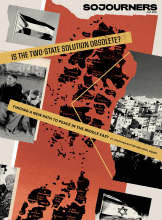israeli settlements

ONE OF THE most misleading words in the recent explosion of violence between Israel and Hamas is “conflict.” There is no symmetry or equivalence between desperate rocket attacks, deplorable as they are, from Hamas and the massive, disproportionate blitzkrieg by the region’s dominant military power. And, as usual, the casualties in such attacks were disproportionate as well: More than 20 times as many Palestinians, including many children, were killed, most of them predictable deaths from Israeli air force strikes on population centers in the Gaza Strip.
The bloodshed has sparked renewed calls for the “two-state solution”—the establishment of a Palestinian state alongside Israel. But, as Palestinian-American Jonathan Kuttab and American-Israeli Oriel Eisner explain in this issue, Israeli settlements have made the two-state approach impossible, and thus made clear the need for a shift in our thinking. As Kuttab writes, new thinking “would require each group to sufficiently empathize with and understand the hopes, fears, interests, and aspirations of the other group.” This spring’s violence makes painfully evident why such new thinking is urgently needed.
WHITE HOUSE Chief of Staff Denis McDonough told an audience this spring that “an occupation that has lasted for almost 50 years must end, and the Palestinian people must have the right to live in and govern themselves in their own sovereign state.”
McDonough decried the illegal construction of settlements in Palestinian territory, under Israeli Prime Minister Benjamin Netanyahu and his predecessors, as intentionally seeking to divide Palestinian communities. He added, “like every administration since President Johnson, we will continue to oppose Israeli settlement activity since it undermines the prospects for peace.”
But many activists refuse to continue to merely decry the occupation, year after year, decade after decade, while facts on the ground worsen and a just peace grows seemingly more elusive. For these activists—and they include many U.S. churches, peace groups, and humanitarian organizations—the time has come to put teeth into efforts to end Israel’s occupation of Palestinian territory and thereby impel progress toward a just peace in the region.
The Presbyterian Church (U.S.A.) has been debating various divestment measures since 2004, and last year the denomination voted to divest from three companies that supply equipment used in the occupation of Palestinian territory.

President Barack Obama will be visiting Israel and Palestine in March. I call on you to write to Obama and tell him that if he is coming to engage Israelis and Palestinians in talks that will lead to a just peace, he is then welcome. Otherwise tell Obama to stay home.
Tell Obama that the world will be watching his upcoming visit and people all over our planet will look to his visit with hope and expectation. Tell him not to disappoint humanity by carrying on U.S. politics in the Middle East as usual.
Tell Obama when he visits us here to stand by the values that he reiterates in almost every speech: freedom, independence, equality, and justice for all.
American Christian Zionism is pushing the U.S. government to support Israeli policies that our international friends find immoral and illegal.
We have come to believe that Christian Zionism underwrites theft of Palestinian land and oppresses Palestinian people, helps create the conditions for an explosion of violence, and pushes US policy in a destructive direction that violates our nation's commitment to universal human rights.
We write as evangelical Christians committed to Israel's security. We worry about your support for policies that violate biblical warnings about injustice and may lead to the destruction of Israel.
